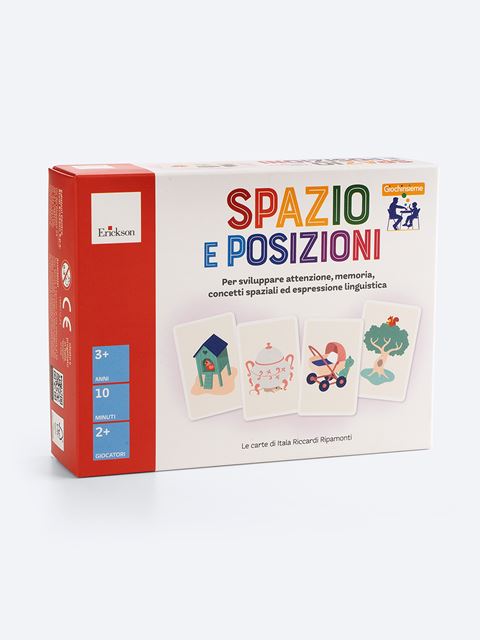 EN
EN
 PT
PT
For developing attention, memory, spatial concepts and linguistic expression

Product: Teaching tools
ISBN: 9788859014997
Publication date: 01/03/2018
Suitable for: Nursery 1st Level (ages 3-4), Nursery 2nd Level (ages 4-5), Primary 1st level (ages 6-7), Primary 2nd level (ages 8-10)
REQUEST A SAMPLE OR MORE INFORMATION
 Rights sold to:
Mexico, Oman, Saudi Arabia, United Arab Emirates, Qatar, Bahrain, Kuwait, Tunisia, Egypt
Rights sold to:
Mexico, Oman, Saudi Arabia, United Arab Emirates, Qatar, Bahrain, Kuwait, Tunisia, Egypt
The primary objective of the «Space and Positions» cards, like their predecessors in the same series (“Sequences and Relationships”, “Shapes and Logic” and “Colours and Associations”), is to actively stimulate children’s learning, by engaging them, most importantly, in a personal challenge.
The aims to be reached with the different activities suggested are multiple:
• to encourage the learning of spatial concepts;
• to establish their correct denominations;
• to encourage children to assume different points of view and thus to overcome their egocentrism;
• to help children distance themselves from tangible reality, pushing them towards abstraction and symbolism;
• to use effective, correct language, with particular attention placed on the use of prepositions (e.g. over, under, near to, far from, in front of, behind).
These cards can be used for the games suggested below with children aged 3-4 years upwards. The most suitable games will be chosen according to the mental age and needs of each individual or group and according to any potential difficulties exposed, in so much as the cards can be used in a wide range of different games of varying complexity.
Age: 3+
Box contents: 60 cards
Skills developed: Memory and Attention; Spatial concepts; Linguistic expression;


THE CARDS BY ITALA RICCARDI RIPAMONTI
A new series of games specially designed for speech therapists, psychologists, rehabilitation professionals, curricular and special needs teachers, and educators.
This series was conceived by Itala Riccardi Ripamonti, a speech therapist and university lecturer and the founder of «Centro Ripamonti Onlus» in Cusano Milanino, which is one of the most qualified Italian centres for diagnosing and treating hearing, language, behavioural and learning problems.
Using cards, the Giochinsieme series offers various activities, which can be used both in the educational and (re)habilitative spheres, and which stimulate different abilities:
The adult using the different cards should ensure that they encourage integration of these different functions as well as choosing the most suitable cognitive strategy to adopt in order to complete the task/activity successfully.
The first games in the series

SHAPES AND LOGIC
is ideal for developing logic skills: ordering, classifying and organising. It contains two decks of 54 cards, which can be used to play over 10 different games.
Age: 5-14 years

SPACE AND POSITIONS
is designed to develop attention, memory, spatial concepts and linguistic expression. It contains 60 cards, which can be used to play over 13 different games.
Age: 3+
Theoretical premises of the games
All these games follow modern psychopedagogical theories that believe children should be motivated and actively involved in the activities set by their educators. Play is undoubtedly the most malleable and suitable activity for individuals during growth, when their learning is connected to the ability to reapply, in an original way, what they have learnt; it is also the activity children participate most enthusiastically in, carried away by the pleasure of discovery and at times of competing.
The different activities offered in this series of card games aim to stimulate different executive functions, namely: attention, initiating, executive control or inhibition (the ability to inhibit), shifting (the ability to move from one task to another) and updating (the ability to update working memory).
The adult guiding the activity - be it educator, teacher, therapist or parent - should pay attention to the integration between these different functions as well as the choice of the most suitable cognitive strategy to adopt.
The activities suggested in this series are designed to be flexible and open to personal variations, according to individual needs and different educational situations. In this way the child's thinking skills, autonomy and creativity are developed.